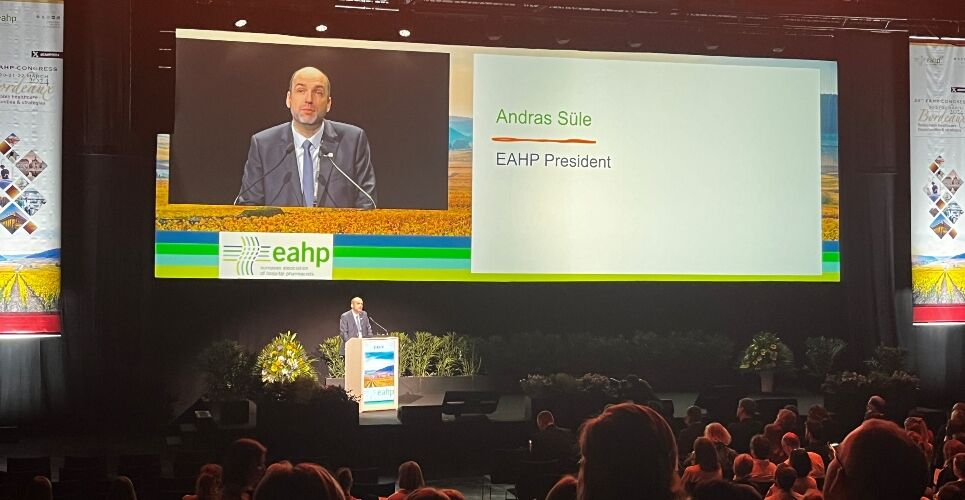It is imperative to underscore that the hospital pharmacist is, and must be, an indisputable part of all health systems at all levels in frontline patient care, and the profession must advocate for themselves and reinforce this narrative.
This was the message from András Süle, president of the European Association of Hospital Pharmacists (EAHP) as he opened the association’s recent 2024 Congress.
He acknowledged the turbulence that the profession has recently been experiencing across Europe, particularly ‘major issues like medication and medical device shortages, workforce instabilities, really wild ideas about outsourcing hospital pharmacy services, or environmental and sustainability questions, just to name a few’.
Offering further insight into workforce instabilities, Mr Süle said: ‘It is crucial to recognise that while unemployment rates are seeing an all-time low in all developed countries, our societies are ageing, and that has become an issue in all our countries where we cannot afford – we cannot let – that healthcare workforce simply to fall out of love with their profession.
‘But they do so because of workplace stress, failures in organisational culture, exhaustion and burnout, and often giving up their career paths in the end. Our policy and advocacy teams need to treat this as a top priority, regardless of our geographic locations.’
To achieve this, he emphasised the need for future-proof strategies to drive the pharmacist profession forwards and consolidate efforts to support frontline patient care.
‘Future proofing in our interpretation means to pursue what really matters to patients the most, and what we think really matters to them is that there are improved disease outcomes, there is less of a treatment burden, we can diminish medication related errors as much as possible,’ he said. ‘All this needs robust proving grounds and evidence-based methodologies and real-world metrics.’
A transdisciplinary mindset
Underpinning all of this, Mr Süle said, is the need for collaboration and the adoption of a ‘transdisciplinary mindset’.
Progress has already been made here, with a ‘confluence of academic, community and hospital pharmacy branches of our profession’, as well as a convergence between medical doctors, nurses, pharmacists, pharmacy technicians, patients and others, he noted.
But he said that what matters now is for strategic questions to be answered by pharmacists to consolidate their place within this broader healthcare landscape.
‘How often do we get the input that pharmacists do not advocate themselves well enough? Does the public actually know and see us as the personnel who solely dispense medications? Do they know that we work also in the frontline? Do they recognise us in the ICUs and compounding laboratories, solving shortages or going through several hurdles to mitigate or prevent their medication-related errors?’
Mr Süle put one final question to the EAHP Congress delegates: ‘What would it take for us to change that narrative?’ And he provided his take on the answer.
‘In my eyes, the most important part of this journey is bonding,’ he said. ‘We need to bond with relevant stakeholders so that they see us as a resource and not as a threat. We need to bond with patient organisations, invite them to our events, let them speak their minds and show what really is their request from our profession.
Expanding hospital pharmacists’ networks
Only by expanding networks and advocating for the broader recognition of hospital pharmacy can the profession hope to tackle the challenges it is facing, Mr Süle suggested.
‘We need to grow our networks; we need to go beyond our usual borders and go transdisciplinary and this, in a nutshell, means that we need diversity. Our patients and their therapies are more and more diverse and that would require a similar response from healthcare professionals and hospital pharmacists,’ he said.
‘This diversity sets the scene for collaboration, and collaboration is paramount for transdisciplinary mindset. Such a mindset is the key to further success, as diverse teams provide better solutions to complex problems.’
In his concluding remarks, Mr Süle championed hospital pharmacists’ proactivity and encouraged colleagues to continue down this path, exploring and pushing the boundaries of the profession.
‘Whenever new challenges arise, [hospital pharmacists] have been amongst the first to take on new tasks and new responsibilities,’ he said. ‘That proactive nature, fuelled by an insatiable curiosity, is, based in my eyes, the single greatest feat of our colleagues – of you all.’

